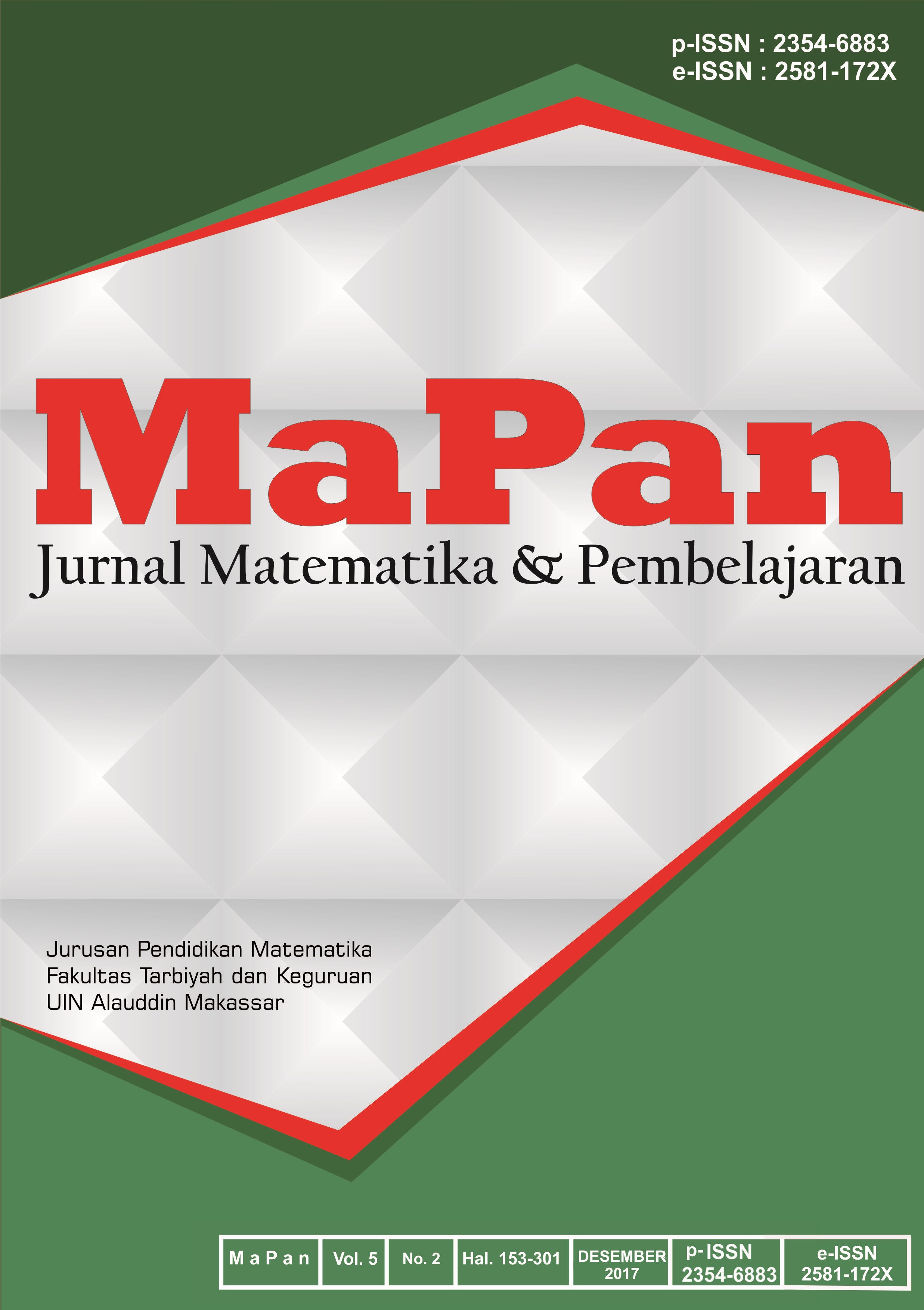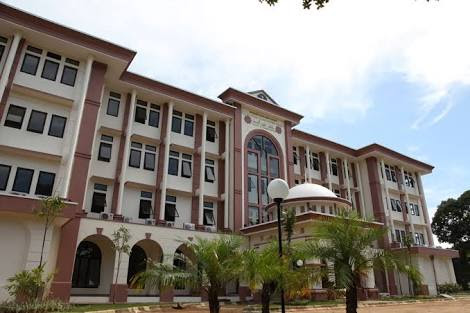PENGARUH PENGUASAAN KONSEP TEOREMA PYTHAGORAS TERHADAP KEMAMPUAN MENYELESAIKAN SOAL-SOAL BANGUN RUANG SISI DATAR PADA SISWA KELAS VIII MTS NEGERI BALANG-BALANG
Abstract
Abstrak:
Penelitian ini bertujuan untuk mengetahui pengaruh penguasaan konsep teorema Pythagoras terhadap kemampuan menyelesaikan soal-soal bangun ruang sisi datar pada siswa kelas VIII MTs Negeri Balang-Balang. Penelitian ini adalah penelitian kuantitatif jenis ex post facto. Populasi yaitu seluruh siswa kelas VIII MTs Negeri Balang-Balang yang berjumlah 204 siswa. Adapun sampelnya berjumlah 102 orang yang diambil melalui teknik simple random sampling. Instrumen penelitian berupa tes soal Pythagoras dan soal bangun ruang sisi datar. Teknik analisis yang digunakan adalah analisis statistik deskriptif dan analisis statistik inferensial yaitu dengan regresi linear sederhana. Hasil analisis deskriptif menunjukkan bahwa penguasaan konsep teorema Pythagoras dan kemampuan menyelesaikan soal-soal bangun ruang sisi datar masing–masing berada pada kategori tinggi. Adapun hasil analisis statistik inferensial pada regresi linear sederhana menunjukkan bahwa terdapat pengaruh antara penguasaan konsep teorema Pythagoras terhadap kemampuan menyelesaikan soal-soal bangun ruang sisi datar siswa kelas VIII MTs Negeri Balang-Balang.
Abstract:
This study aims to determine the impact of the mastery of Pythagoras Theorem concepts on the ability of MTs Negeri Balang-Balang grade VIII students to solve polyhedron problems. This study is a quantitative research with ex post facto design. Statistical population consists of all grade VIII students in MTs Negeri Balang-Balang which was 204 students. The number of sampling used is 102 respondents taken by simple random sampling technique. The research instrument was a test related to Pythagorean an polyhedron problems. Descriptive and inferential statistics were performed as the statistical analysis. The descriptive analysis result shows that the mastery of Pythagoras Theorem concepts is within the category of ‘high’ and the ability of solving polyhedron problems is as well. The inferential statistical analysis using simple linear regression shows that there is an impact of the mastery of Pythagoras Theorem concepts on polyhedron problem solving ability of Grade VIII students of MTs Negeri Balang-Balang.
Downloads
References
Afifah, D. S. N. (2013). “Identifikasi kemampuan siswa dalam menyelesaikan soal aritmatika sosial ditinjau dari perbedaan kemampuan matematika. (Online). Jurnal Pendidikan Matematika STKIP PGRI Sidoarjo, 1(1).
Dahar, R. W. (2011). Teori-teori belajar & pembelajaran. Jakarta: Erlangga.
Danim, S. (2010). Pengantar kependidikan. Bandung: Alfabeta.
Hamzah, A. & Muhlisrarini. (2014). Perencanaan dan strategi pembelajaran matematika. Jakarta: PT Raja Grafindo Persada.
Muchyidin, A. & Amin, A. H. F. (2012) “Pengaruh penguasaan teorema Pythagoras terhadap kemampuan menyelesaikan soal-soal garis singgung lingkaran kelas VIII SMPN 1 Leuwimunding.” Jurnal Online Eduma Volume 1 No. 2 Tahun 2012.
Putra, A. R., dkk. (2014). The analysis of concepts mastery and critical thinking skills on invertebrate zoology course. International Journal of Science and Research, 3.
Rohim, N. (2011). Pengaruh penguasaan konsep bangun datar terhadap kemampuan peserta didik dalam menyelesaikan soal-soal bangun ruang sisi datar kelas VIII MTs Nahdlatut Thullab Manggarwetan Godong Grobogan. Skripsi. Fakultas Tarbiyah IAIN Walisongo Semarang.
Sood, V. (2013). “Effect of mastery learning strategies on concept attainment in geometry among high school students.” International Journal of Behavioral Social and Movement Sciences, 2(2).
Susanto, A. (2013). Teori belajar pembelajaran di sekolah dasar, Jakarta: Kencana Prenada Media Group.
Tayruakham, S., dkk. (2009). Factors influencing mathematic problem-solving ability of sixth grade students. Journal of Social Sciences.
Tirtarahrdja, U. & Sulo, S. L. L. (2015). Pengantar pendidikan, Cet. II; Jakarta: PT Rineka Cipta.
Copyright (c) 2017 MaPan : Jurnal Matematika dan Pembelajaran

This work is licensed under a Creative Commons Attribution 4.0 International License.


